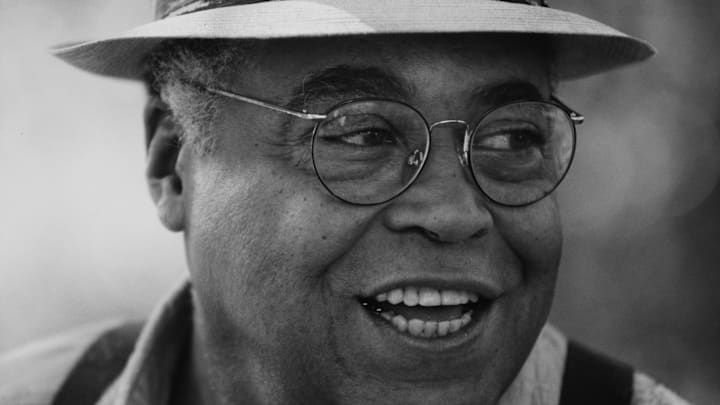“Remember who you are. Remember.” This is one of the most iconic lines coming from one of the most iconic voices in pop culture. For nearly 70 years, James Earl Jones made a mark on the screen, stage, and television. Many know him as the iconic voice behind Darth Vader of the Star Wars saga and Mufasa of The Lion King franchise.
But there is a lot more storied history from the world-famous gravel voice that brought the entire galaxy to its knees and that led a boy to be king.
Humble Beginnings
Born on the 17th of January 1931 in Mississippi, James Earl Jones found his passion in poetry and acting to overcome his stutter, making him embrace his deep voice. It is truly amazing how overcoming a disability led him to be one of the most recognizable voices in film.
He then ventured into theater, eventually debuting in 1957 on Broadway with the play Sunrise at Campobello. By then, Jones had become a fixture in productions from Shakespeare in the Park, such as Othello, Hamlet and King Lear. However, he gained further recognition with his Tony Award-winning role in The Great White Hope as a boxer based on the real-life Jack “Galveston Giant” Johnson. Jones would later reprise the role in its 1970 film adaptation, to similar acclaim (including an Oscar and a Golden Globe nomination).
But before his Tony-winning work, Jones made his film debut in the Stanley Kubrick satirical masterpiece Dr. Strangelove as bombardier Lieutenant Lothar Zogg.
Two Icons
Jones remained active finding roles in film, TV and theater. However, it was his vocal performance as the tyrannical Darth Vader in Star Wars that launched him into global success. He would return for the voice role in The Empire Strikes Back and Return of the Jedi.
His deep timbre proved to be the last piece of the puzzle to define the wrathful Sith Lord. Thanks to Jones, Darth Vader became arguably the most popular character of the long-enduring franchise.
Initially, Vader’s performer David Prowse intended to voice him. However, director George Lucas found his accent “unsuitable” and initially thought of casting Orson Welles. But as a fresh voice, in came Jones. Fun fact: Jones requested to be uncredited as the voice of Darth Vader, but he was soon credited in Return of the Jedi, as well as the first movie’s Special Edition.
On the opposite side of Darth Vader is the noble lion ruler Mufasa of The Lion King. Jones voicing Mufasa is one of the highlights of an already outstanding Disney animated masterpiece. As Mufasa, he delivered a commanding presence as the king of the Pride Lands but also gave a heartwarming voice as the father to Simba – the right balance of grandeur and grace. Without his voice, one would imagine how will Simba’s arc turn out.
With them, Jones lent an imposing voice to two of cinema’s most iconic fathers – one is honored from the start, and the other is redeemed in the end.
Others with Disney
James Earl Jones was also involved in other Disney projects, as well as Fox-adjacent ones, with the majority counting on his deep voice. In The Simpsons, he voiced the mover, Serak the Preparer and the narrator of “The Raven” of the first “Treehouse of Horror” episode, making his voice as the perfect first impression for the long-running Halloween special.
He also played the mysterious elderly Mr. Mertle in The Sandlot and The Sandlot 2, who concealed a poignant secret that the Sandlot boys would soon find out. Other Disney projects include Fantasia 2000, wherein he introduced the “Carnival of the Animals” segment, and the Disney channel series Recess, wherein he voiced Santa Claus.
Other Roles
Jones never lost track of getting roles throughout the years. While not as prolific as others, he appeared in many genuine projects, such as The Man (1972), Conan the Barbarian (1982), Field of Dreams (1989), The Hunt for Red October (1990), Sneakers (1992) and Cry, the Beloved Country (1995). But his darkly comedic turn as King Jaffe Joffer in Coming to America is a notable favorite.
Even his theatrical roles kept coming with Cat on a Hot Tin Roof (2008), The Best Man (2012), You Can't Take It with You (2014) and The Gin Game (2015–2016). He also achieved his second Tony Award for Best Actor in a Play in the August Wilson play Fences (1987) as a former baseball play-turned-working-class father who faces poverty.
However, one thing that emerged from Jones after Naked Gun 33+1⁄3: The Final Insult – appearing as himself. His cameo appearances include those in Mad About You, Will & Grace, Sesame Street and The Big Bang Theory. With the latter, he cameoed in the episode “The Convention Conundrum” alongside Carrie Fisher.
Further Legacy
It should be noted that Jones is one of the members of the prestigious EGOT – performers who received an Emmy, a Grammy, an Oscar and a Tony. But his achievements were not just limited to the American Theater Hall of Fame in 1985, the National Medal of Arts in 1992, and the Kennedy Center Honor in 2002. A Broadway theater was even named after him.
James Earl Jones more than became a household name with two iconic roles. His contributions to the arts remain unmatched among his peers. His voice is so valuable that he signed with Lucasfilm, allowing them to use his voice recordings to artificially generate Darth Vader’s iconic voice for future projects.
But even with that official arrangement, nothing can replace the true and groundbreaking James Earl Jones. Rest in power.
